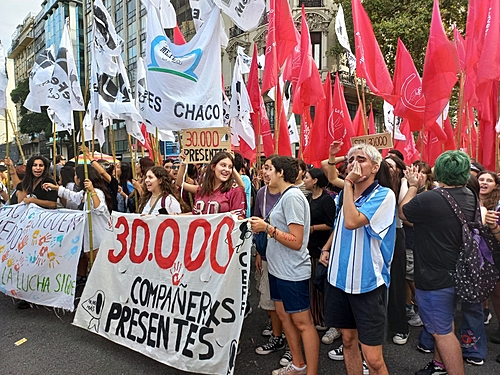
The Plaza de Mayo, historic stage of the fight for human rights in Argentina, in Buenos Aires, receives thousands of people this Friday (24) to celebrate another Day of Remembrance, Truth and Justice. The date dates back to March 24, 1976, when a coup d’état by military, civil and religious leaders installed the last and bloodiest military dictatorship in the country, which left 30,000 people missing.
Argentines use the motto “never again” to repudiate the dictatorship / Fernanda Paixão
This Friday’s act takes place in the year in which Argentina’s 40th anniversary of redemocratization is celebrated, and it is also the first Day of Remembrance without Hebe de Bonafini, one of the first mothers who started to march around Plaza de Mayo in search of their missing family members. Hebe was president of the Association of Mothers of Praça de Mayo and passed away in December of last year.
“The Argentine fight in defense of human rights is transformed by these mothers and grandmothers”, stated the Secretary of Human Rights of Argentina, Horacio Pietragalla, during the 3rd World Forum on Human Rights that took place this week.
The event in Buenos Aires featured the Minister of Human Rights of Brazil, Silvio Almeida, and took place in a former dictatorship torture center, ESMA.


Hebe de Bonafini had two sons and a daughter-in-law who disappeared during the military dictatorship. / Photo: Association of Mothers of Plaza de Mayo
Pietragalla is a victim of the Argentine dictatorship. The son of disappeared people, he was one of the babies stolen by the military when they kidnapped pregnant women or small children, a recurrent practice in the last dictatorship in the country – and which spurred the rounds of mothers and grandmothers in Plaza de Mayo. Horacio recovered his identity in 2003, being the 75th grandchild recovered by the Grandmothers of Praça de Mayo. Today, there are already 132 recovered grandchildren. The last two were recovered in December last year.
“There is a punctual element that made a categorical change in the construction of human rights policy in the country, which was love. The love of a mother looking for a child”, pointed out Pietragalla. “They were women from different factions: they were Jewish, Catholic, atheist, slum, middle-class, upper-class mothers, mothers who supported the coup because they thought it was one more government, mothers who rejected it because they were politically aware. However, in this tragedy there was a union between these differences and they never lost their objective, which is the memory, truth and justice and the appearance of each companion who had been arrested and disappeared”, said the secretary.

The March 24 march is a tradition in Argentina / Fernanda Paixão
In recent years, a wave of denialism has grown with the conservative sector and the rise of the extreme right in Argentina. Therefore, some political organizations also took to this Friday’s march attacks against democracy in the country and the attempted assassination of vice-president Cristina Kirchner.
Argentina is a reference in the struggle for human rights in the world, with 1,115 people responsible for crimes against humanity.
Editing: Thales Schmidt
Source: www.brasildefato.com.br

